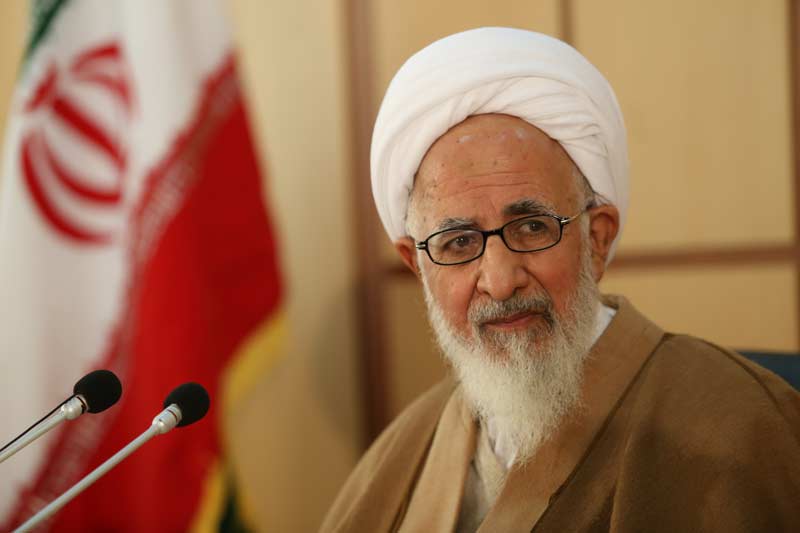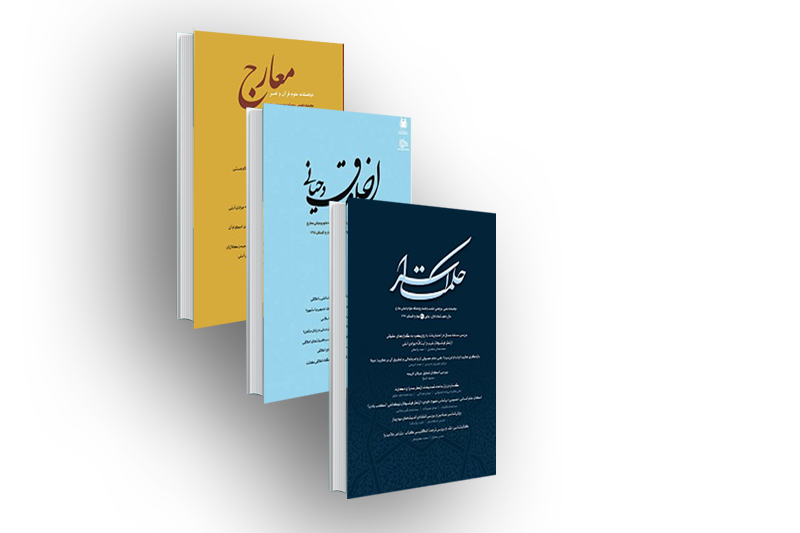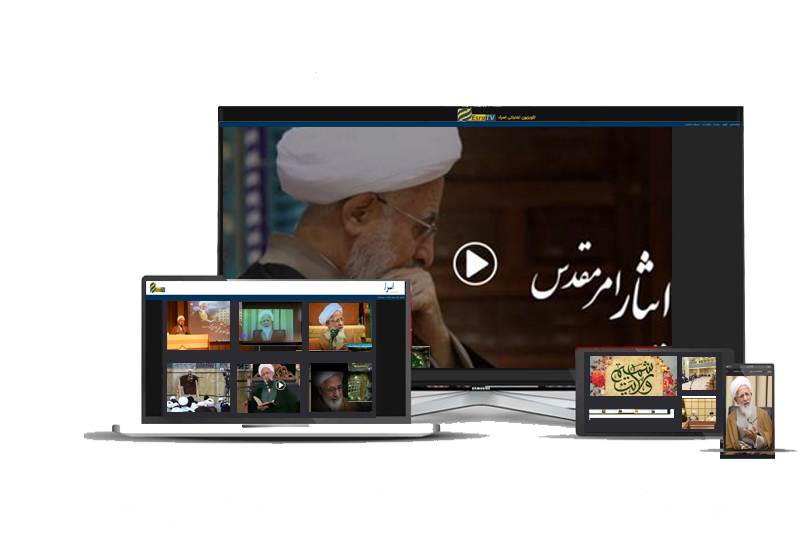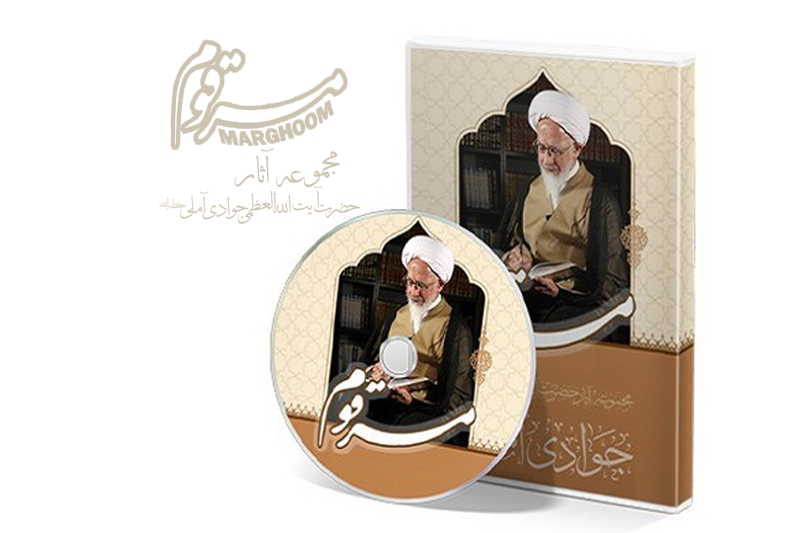Esra's information website: The 11th gathering of intellectual sciences professors, with the speech of Grand Ayatullah Javadi Amoli was held on Thursday, November 29, at 1:00 p.m. and virtually.
The full text of His Holiness' speech is as follows:
In the name of Allah, the Merciful
"Praise be to God, the Lord of the worlds, and may God's prayers and peace be upon all the prophets, the messengers, the Imams, the guidance of the al-Mahdi, and Fatima al-Zahra, the lady of the women of the worlds, and I, their enemies, may not be absolved to God."
We honor you professors, intellectuals and elites of intellectual and narrative sciences. It is the blessed days of the arrival of the Prophet of Ahl al-Bayt (peace be upon them all), and it is the anniversary of the death of the late Allamah Tabatabayi (may God bless him and grant him peace), also honor it. We consider them to be the same as God's prophets and we also honor the eloquent efforts of the High Council of Wisdom. The comprehensive and useful report that you presented was and is very promising, and the congresses ahead of you - God willing - may be more successful than the past.
But we are in the context of blessing, and there was no age or era in which Islamic sciences, especially rational sciences, were supported. Islamic sciences, especially the intellectual sciences, were sometimes treated with disdain by the authorities. When the government system was in harmony with Islamic sciences, especially intellectual sciences, great men grew up. If the government of Baghdad made a development during the era of Mubarak Sadiqin, Baqirin and later Imam Kazim (peace be upon them all) and Baghdad became the center of intellectual sciences, it was because of the presence of Mubarak Imam Sadiq and Imam Baqir (peace be upon them) in Medina after the imams. They brought other students intellectually, they set up intellectual proofs, and those intellectual proofs were developed by their students. May God have mercy on the late Majlisi! In Bihar, during the scientific discussions of Imam Sadiq (peace be upon him), he narrates that Imam Sadiq (peace be upon him) said that Aristotle said, [1] This is honoring a Greek sage. Our late professor Allameh Shearani narrates this story in the description of the principles of Kafi by the late Mollasaleh Mazandarani. [2] The late Mullah Saleh was the son-in-law of the late Majlisi I, and he was also his student, and he wrote twelve volumes of commentaries on the first and second volumes of Usul Kafi. The description of Usul Kafi of the late Mullah Saleh is twelve volumes, these twelve volumes are the description of the first and second volumes of Kafi. Our teacher, the late Allameh Sha'rani, has a commentary on it, in that commentary he narrates the narration of the late Majlisi, then he mentions Hafez's poem, where is Aristotle and where is Imam Sadiq (peace be upon him)! This is the pride of Aristotle, whose name comes from the pure lips of Imam Sadiq (may God bless him and grant him peace): "Whoever I am, I will pass over that perfume" [3] This is a position! He says, "Blessed is Aristotle, whose name comes from the pure lips of the Almighty." This is narrated by the late Majlisi in Bihar, then our teacher Allameh Shearani narrated this in his description of the principles of the late Mullasaleh, then he recites Hafez's poem, "Whoever I am, I will pass over it for the sake of Atir".
This kindness of the Ahl al-Bayt (peace be upon them) towards the intellectual sciences and the fact that we have not seen anywhere that the imams (peace be upon them) prevent the translation of philosophy into Arabic and non-Arabic, that is what has entered Islam! If this was a case of indifference, they would not have accepted it, at least in one place they would have said that what is this science that has come in Islam as a prohibition against evil! While it has not come anywhere. Apart from the fact that he did not come, they also trained their students in the same way. Mr. Kennedy, an Arab philosopher, he was born at the end of the second century, i.e. 185 Hijri. He was an Arab philosopher in Baghdad and had students.
Now we will tell you what philosophy is and when can we become philosophers? When will the high council of wisdom be able to fulfill its mission? Reasonable lessons and discussions are common philosophy lessons and discussions, and this is not philosophy. This is not what should be, this is something else.
This was a noble building. Moatasim Abbasi gave his students to this philosopher, and when the government is interested in a science, that science grows. Then we come to the Safavid era. They were not very leaders, but anyway they wanted Islamic scholars, Baha'i sheikhs, Mirdamads, other elders to come. Because they showed a certain amount of humanity to the intellectual and narrative Islamic sciences, they grew, Mirdamad became great, Mulla Sadra was born, Baha'i Sheikh was born, and other sages were born. Now, by God's grace, it is higher than Baghdad It is also higher than Isfahan, a cleric who studied philosophy himself, was a student of Allameh, and his order is that you revive philosophy, if you don't, others will do it. What blessing is higher than this?! And now this assembly of ours is under his collection, what blessing is higher than this? Now, if we don't try and do our duty, we have no excuse. When have you seen the leader of a military come to raise a group of students and take charge himself and say that if you don't take charge, others will? This is dozens of levels higher than the Safavid era. If they were able to train a Baha'i sheikh, why can't we do this?! All means are provided by God's grace. This was a series of content that what is our duty in the present era? Now the blood of the martyrs and elders and the like is safe in its place.
The second issue is that we are currently studying and discussing philosophy, this is necessary but not sufficient, but what is philosophy? My suggestion is that you professors, when you have taught one course of this book, leave the rest of the teaching to your students or reduce them. He is the first Islamic philosopher, what did he say? Why is his philosophy not developed? When I visited Kennedy's treatise, which I was studying, I saw that he says "Philosophy is the knowledge of human nature" [4]. Who am I? where did i come from What is my eternity? Where do I want to go? How do I want to go? In general, the philosophy is "al-philosophy of the knowledge of the human being", at that time the world is for a small person, let alone that - God did not - say this and block the way for it!
You elders pledge that some of you will work on Kennedy's philosophy, which will not last more than two years, some elders will work on Farabi's philosophy, how did he become the second teacher? Although before him there was an Arab philosopher, Kennedy, after him came a philosopher like Ibn Sina; Ibn Sina, if a man is a thousand years old, it is because in all Islamic sciences, everyone has a teacher and a student. In all sciences, it is the same with whom a person studied, who is his teacher, what lessons he studied, and what are his students. There are people, this is for all scholars, but the late Buali had neither a teacher nor a student; Because he says that those elementary problems are the basics of logic, I studied with Abu Abdullah Natali, then I solved the problems of logic myself, he had a teacher in the elementary problems of philosophy, he solved the deep problems of philosophy by himself, he solved the theoretical problems of medicine by himself, he did not have a teacher at all, nor did he have students He didn't because he trained many students, Mr. Bahmanyar is a distinguished person, but the distance between the student and the teacher is huge! For example, the late Sheikh Ansari trained students, there is a distance, but not much, the late Akhund Khorasani trained students, there is a distance, but not much; But no one should come close to me during this time! This is a calculation, what intelligence was this! May God have mercy on the late Khajah Tusi! A treatise has two or three pages that describes the types of wisdom, which is 44 disciplines from one point of view and 35 disciplines from another point of view; It is logic, and it is natural science, and it is mathematics, and it is theology, in theoretical philosophy and theoretical wisdom; It is self-discipline, and morality is home management, and city politics is a part of practical wisdom. These also have subsets that are 35 disciplines in total, if we do not count the logics, it is 44 disciplines if we count the logics. This is a two-page or three-page treatise, which is written by the late Khwaja at the end of the Naqd al-Muhassil. All of these are blessings from Boali's table. This healing, which is one of the heaviest books, may God bless the late teacher Allameh Tabatabayi! He said that it is known that this is part of his spelling, it is not linear, they wrote logic and natural by hand, they spelled this; It is now one of the heaviest books.
Some of the elders should work on Farabi and some of the elders should work on the late Buali and others like him. It is unlikely that these blessings will be granted to us later! No matter who comes and what he brings, this is not the case! I myself saw that he participated in the lessons of the late Allameh, and he was also his elder brother. Now, their honorable brother is in charge of "Hakmat Sadra" foundation, what do you want better than this?! External means, internal means, everything is available. Kandi's philosophy should be specified, Farabi's philosophy should be specified, Bu'ali's philosophy should be specified. Never teach a book more than twice! May God bless the late Ayatollah Gharavi! We learned from them for the first time, in Amol, some of the men were five years older than us, some were four years older than us. When we went, we asked him to give a lesson, he said that I am not going to teach the rules here, we are going to talk about "general and special" because it should be the same thing for me. This order was effective for us on the same day. We did not teach any book more than once or twice. Now the final books, which were not more than that, reached three times, but until there is a higher book, a person should teach at most once or twice, for himself A person should also have a fruit. They said that it should have a fruit for me too; It was that he started the first of the rules that he said last year for the previous round, from "general and special". At that time, we went to one of the students of the late Agha Zia who came and believed in Agha Zia very much. He said: under Qamar Al-Amali is not as great as Agha Zia! He was very interested in the late Agha Zia, mixing all these with God's prophets! After this, the special opinions that were in the philosophy of God then reached the supreme wisdom, which is the key to these words and is in everyone's hand. This is a section.
Another part is that "the time that passed" may God have mercy on the late teacher Allameh Tabatabayi! The late Allameh could not be known for his philosophy and travel lessons, he was lost in academic and private meetings. One night it was the turn of this meeting at our house. I have already seen that the late Mr. Ali Hakim said in Bada'i al-Hakim that the contrast between rich and poor is true, which is "nothingness and queen" in relation to each other, and the contrast between the blind and the sighted is "nothingness" in relation to humans. and the queen" because the person who is blind has the ability to see, but he does not have the ability, but compared to the wall, which does not have the ability, this is not "nothing and the queen", it is a "contradiction", they say the contrast of "nothing and the queen" in rich and poor is "nothingness and queen"; Because this person who is poor has the ability to do it, he has the dignity of it, but he has not reached the actuality, but in the enlightening verse ﴿Ya ayyyyah al-Nasoo antumu al-fuqaraa o il-Allah and wa-Allah hu Al-Ghaniyy al-Hamid﴾ [5] Man is poor, God is rich, that is, man - God willing - it has that dignity and that ability, but it has not actually come to fruition or is it impossible? Therefore, the contrast between rich and poor is the contrast of "contradiction" and not the contrast of "nothingness and queen". What happens if a poor person does not have the ability to be rich? This was new for us. That night, it was our turn to meet at home, and by the way, they were visiting Haram Musharraf and arrived home earlier than others. I told him Haj Agha! The late Agha Ali Hakim said that the contrast between the rich and the poor is not the contrast between "nothingness and the queen", it is the contrast of "contradiction". I got up first to escort them to the door, I said Haj Agha! What happened to Agha Ali's order? He said that Agha Ali is right. This is a view in philosophy, the philosopher and the sage do not say that I am capable but I am not. May God have mercy on our late master Haj Agha Zia Amoli! The son of the late Ayatollah Agha Sheikh Mohammad Taghi Amoli, both father and son attended Agha Zia's classes. The late Agha Zia wrote "Safwa al-Mujtahidin al-Ohaha" in the commentary he wrote for the late Ayatollah Amoli. The fact that the community of teachers wrote the speeches of Mr. Amoli, his sales speeches, and not the speeches describing Urwa, which were written by themselves, is the criticism of the late Mr. Naini, who is the "Cafe of the Great Mujtahdins". Both Mr. Naini and Mr. Zia have this about him. When the late Haj Agha Zia came, the problem of interpretation and the problem of hadith in Amol became our official lesson there for the first time. I don't know on what occasion they brought up the blessed Surah "Hud" there, and they taught us the deeds of the late Sadouq that hadith should be in the field, interpretation should be in the field. This can clarify what Kennedy said, "The philosophy of knowing the human being". Now let's reach the result.
The next thing is that now our relationship with Hikmat Sadrai is almost official. If we refer to the book of another sage and to the basis of another sage, this is implicit, this is the situation of our area! My suggestion is that we should be the same towards the books of the late Mirdamad, he was a great sage! Many of the orders of the late Sadr al-Mutalaheen are derived from Mirdamad's orders. Mirdamad has a Qabsat, a calendar of faiths that has defined the subject of science and defined all sciences. This commandment, which now contains the enlightening statements of Sayyedna al-Estad Allameh Tabatabayi at the beginning and end, which is an interpretation of the wisdom of the late Mulla Sadra, its root is in the commandments of the late Mirdamad. What is at the beginning and the end is that in these issues of ours, based on the originality of existence, when they say "human being exists", give it to a writer, he says that "human being" is the beginning, and "existent" is news, give it to a sage, he says that "human being" is news. It is the first, and Al-Mujud is the beginning of the latter, because it is a being that has become like this. This is in the commands of the beginning and the end, its origin is in the statements of the late Sadr al-Mutalaheen, and its main root is in the calendar of the faith of the late Mirdamad. The late Mir Damad has said that when you said "Al-Aql exists" this news is the first and the beginning of the last, that is "Al-Mujud Aql". This way of philosophy makes the sage agree that the first thing he sees is God. It is a being that comes in this way, it is an existence that appears in this way, it becomes intellect, it becomes soul. Now, the example of these is "Al-Insan is present", the example of the late Mir Damad in the calendar is "Al-Aql is present" when you say "Al-Aql is present" it means a being that has become like this. The essence of existence is also by the hand of the Holy Essence of God; Then everything that a person sees, if it is good and merciful, it is from God, and if it is imperfection and evil, not created by God, it is from the soul of the person. At that time, this becomes clearer with the enlightening statement of Hazrat Amir (peace be upon him) in Nahj al-Balagha. These who have made the issues of Nahj al-Balagha the subject, this hadith which is in Nahj al-Balagha has the blessed presence of Hazrat Amir (may God bless him and grant him peace) who said, "Inna al-Miskein Rasool Allah",[6] They considered this to be one of the attributes of the Prophet, which is one of the attributes of the poor Prophet, while the Prophet is trying to say that "Oh Al-Ghani"! This poor man who came to your house is asking, "Allah" has sent him, "Inna Al-Mishkeen Rasool Allah" has sent him. He gave you financial status from that side and sent the needy to your door from that side. This case is specific, neither the "poor" is the Messenger of God, nor the "al-Ghani al-mutlaq" is the Messenger of God, this person who came and gave you something was also sent by someone else. This will be "Hu Awal". This issue of "existing intelligence" is not such that we only discuss it in its beginnings; When we say "Al-Qa'im Zayd", we are saying the first and last news, this time it has no science; But if we say that "the existing human being" means the entity that appeared in this way, or "the existing al-aql" is the entity that appeared in this way, it has a scientific, cognitive and practical burden, then this hadith becomes clear. This "In the poor is the Messenger of God" is not specific to the poor, the rich man who came to give something to man, he was also sent by God; So ﴿we have a lot of grace from God﴾.[7] This view educates the philosopher, Allameh Tabatabayi, he was not the only sage and teacher, someone who does not think of God all his life, lives wisely and does not have signs of monotheism and the like in him, live a normal life. Let his iftar be a kiss on the shrine! The only thing is, which is the first news and which is the latest news, this is not a problem and it does not solve anything. Then we will come to the fact that it is some types of wisdom that saved the world, the supreme wisdom was not the only one that solved the problem of the originality of existence and the originality of nature and the like; As a result of humanity and mysticism, the transcendental wisdom saved those deficiencies of wisdom and freed the principle of philosophy; Because philosophy made a profound scientific statement that is very true, there have been many criticisms on it that remain. The rule of "Al-Wahed" [8] is one of the most valid rules that if something is purely simple, two different things cannot be issued from this simple, because it must be suitable, the word is right, "Al-Wahed is not issued by me except one." This rule is very valid. When it reached the hands of Fakhr Razi, he made many mistakes that you, who believe that eight of them are occupied by the same Ptolemaic board of these nine constellations, you call that constellation the atlas, just as the atlas does not have points, this constellation does not have stars, and the ninth constellation does not have stars. All the planets are under the constellation of planets, he rotates, these also rotate, this was the account of the Ptolemaic committee. Then the stars in the eighth firmament cannot be counted, who created them? About some of the affairs of these sages, they came and said that it is the first wisdom issued by God, then they said, what are these next multitudes? They said that there are several directions in the first intellect: it is existence, it is nature, it is self-intelligence, it is origination, and they mentioned five or six directions at most. Then the problem with Fakhr Razi's boasting is that how do you justify these stars that are "uncountable" in the eighth firmament? He stayed in it! And it was a heavy blow to the rule of "Al-Wahed". Al-Wahhid rule, although it is "philosophical of occurrence", but it is "mystical of existence". Mysticism came to this philosophy and said that it was issued from "Allah" that reason is not the first, that which was issued from "Allah" is extended grace, this extended grace is a It is an unlimited matter. Later, Hafez said:
All these pictures and the opposite color that he showed ٭٭٭ is a flash of the spirit of the bartender that fell into the cup[9].
No numerical unit is issued from "Allah", which is an eternal and eternal unit. [10] The eternal is the essence of God, the eternal is the essence of God. Now, if someone talks about the eternal and the eternity of heaven and the people of heaven and the souls of the prophets, "Mamma la rib in it", but these are eternal in nature, will heaven come to an end?! Do the souls of the prophets perish?! Will heaven end?! Now there are four words about hell, but there is no word about the eternity of heaven, this is God's creation. The eternal and eternal God, whose sum is eternal, that extended grace is issued from him, not a personal unit, so that you say that "Al-Wahed does not issue from him alone", what about the rest?! This mysticism saved philosophy and the sublime wisdom made good use of it; At that time, writers and poets who also have literary and intellectual poetic taste, this is what they say
All these pictures and the opposite color that he showed ٭٭٭ is a flash of the bartender's spirit that fell into the cup
The insistence of the late Mir Damad is to say that the basis of our life is based on the first news and the beginning of the last, our senses should be focused. If he was a teacher and taught us something, he taught us; If it was our parents who raised us, he gave, and if someone came and gave financial help, he gave. How is it that "the poor is the Messenger of God" and not "the rich is the Messenger of God"?! Isn't it "the teacher of the Messenger of God"?! At that time, he sent this, the messenger means someone else sent him, he himself is useless, the teacher is useless, someone else sent him. It is true that we respect the teacher, he said when they gave zakat to those who came ﴿ Take from their wealth in charity and purify them and purify them﴿ but ﴿ and peace be upon them﴿ [11] Pray yes, this is true, we have one duty towards the teacher towards Those who respected us compared to those who helped us, yes! But this was sent by someone else. "Indeed the poor is the messenger of God" from that side is the messenger of God. The fact that in some of the narrations it says "Whoever forbids it, God forbids it and whoever gives it, God gives it" [12] confirms the same. The words of the late Mirdamad in the calendar of faith are that we should be like this. My insistence is that Mirdamad's philosophy should be formalized and taught, first of all, there should be a discussion among our elders, now some of its phrases are not familiar, but when this philosophy of Mirdamad was brought up, it will show itself in the teaching, now it is not necessary to use Mirdamad's phrases. but some of his phrases are like this.
The last part of our story, in one of the other stories that happened to us, the late Ayatollah Amoli, Agha Sheikh Mohammad Taghi, which I may have shared with you, once in the beginning of Shahrivar 34, I went to his service to get permission to go to Qom. ; Because this description of Urwa al-Waqhi was not published yet at the time when they were teaching us fiqh and usul, they wrote it at the same time as they were teaching and then published it. The first year we went outside fiqh and usul was his class and we had not learned speech writing and pamphlet writing since it was the first time. Amol Ishan is not known as Mr. Amol, he is known as a young man, the late Najashi narrates one or two stories about young men who were among the companions of Imams. This Talib Amoli, who became the poet of the court of India, this "weakness wherever we sat became a homeland ٭٭٭ grass everywhere we passed" is from this Talib Amoli, he is from this same family. I told them that writing pamphlets is new for us because we have just come out to study, please give us the pamphlets that you give us, we will see them to learn how they write, they were proud to give me their own pamphlet that they gave me some time ago. I wanted to learn how to write. When I visited his pamphlet, I saw that on all the pages above it was written "In the Name of Allah, the Most Merciful, the Most Merciful, or the Lord of Time, Understand"; But in our writings, we have a "Bismillah Rahman Rahman Raheem"! There was not a single page that was not written and did not have "In the Name of God, the Most Merciful, the Most Merciful, or the Most Merciful, Understand" on all pages! This is what I saw. It was the late Saeed al-Ulama, who was the colleague of the late Sheikh Ansari, and the two of them attended Sharif al-Ulama's class. We received a lecture on principles from him. It was not like the late Mr. Amoli's, it was at the top of each page, but one page in between, three pages in between. The margin of it is "Ya Abul Fazl, understand"! It was like this, it was with this opinion.
Mirdamad, who insists that philosophy is based on the first news and the beginning of the last, we should know that this is not the continuation of this principle, if a person reaches this point, it becomes clear that he is a philosopher. The late Mr. Tabatabayi reached here. "Indeed the poor Messenger of God" had reached here; Yes, a person is obliged to respect and honor his parents, his teacher, his friend and companion, to live with courtesy and benevolence, but he should know that this man came from another place and this makes him unbeliever. My last suggestion is the order of the late Fazel Esfahani. I don't know why the owner of Kashf al-Latham became known as Fazel Handi?! He is very big! I visited his grave several times in Takht Foulad. Mustaharid Takht Foulad is the best and most important cemetery of Shias after Wadi al-Salam. This is the Safavid era, and thanks to the Safavid era, there were many scholars there. Many of the late scholars, Mr. Jamal Khansari, Mr. Syed Ahmed Khansari, many of these men whose names we see in jurisprudence books or intellectual sciences, their noble graves are in Takht Foulad. He was also from Isfahani, Mohammad Hasan Isfahani, now why is Fazel Hindi famous? He was also one of those who had theoretical sciences and intellectual sciences together. This Aoun and Akhwan al-Safa Ali understand the book of healing in logic; The late Boali's logic, especially the proof part, is very heavy, that is, studying it is not an easy task, because he himself believes that in logic, the proof part is a duty, while the other parts are useless [13]. Other parts are useless. [14] The reason is that now, in the east of the world, in the west of the world, if someone wants to prove something or deny something, he must bring a proof, and it must be in the form of four; This is Aristotle's work. Mr. Jalili (may God bless him and grant him peace) read one of these volumes of logic with him, we read some of this part of fallacies and some volumes of the logic of healing with him, may God have mercy on him. We discussed the fallacies of a course with him. The late sheikh is wrong that before they wanted to write the word "zareef" or "azraf", they used to leave this point down, but later this point was raised. If someone is not familiar with those previous versions, they don't know what this is, put this point up or down, this is neither a verse nor narration, this is part of human contract. He is wrong that they used to put this point of the word "Azraf" below "Za" and not above "Za". If a person reads the books of that era, he should know and not to fall into mistakes, this is stated in the late Buali's treatise "Maghalatat". In the seventh art, there is this statement about Aristotle's greatness, that there is a gap of centuries between me and Aristotle, and when he wrote this logic, he said that I wrote this logic, there were four forms, and there were analogies and the like, nothing is possible. If he wants to argue unless he has to return to the first form, it is a lot of talk! I wrote this, but I admit my incapacity, my negligence, and my ignorance. If the next elders saw that it was not enough, they should increase it, and if it was too much, they should decrease it. This is what Aristotle said in his writings. The late Boali says that there are very few books that have reached my hands and come out safe! There is no book that can come into my hands and not be criticized, and centuries ago he asked us to reduce or increase, whatever I did, I will not be able to reduce or increase! This is the submission that the late Boali has towards Aristotle in logic in the seventh art.
But the part that I wanted to say was that I went to the late Ayatollah Amoli's service, and now - I will say this in parentheses - may God have mercy on the late Mr. Aghasyed Jalal Ashtiani! Whenever he came from Tehran, he used to visit the Marvi school in Qom. May God have mercy on martyr Motahari! Shahid Motahari's cell was next to ours, after his death it was the madrasa of Qazi. He was also interested in Martyr Motahri, and Maravi school was a place where students from Qom used to go. There, in the presence of Mr. Motahari, the late Seyyed Jalal said that I read the letter to Mr. Motahari, he repeatedly told me that Tehran is not your place, you should come to Qom! We didn't know who Tabatabayi was! All our comrades were from Tehran, Hazrat Agha Hassanzadeh (peace be upon him) came from Qom seven years after us. Some of the elders did not manage to come to Qom at all. The late Mr. Jalal Ashtiani often told me that your place is not here, you should come to Qom. Based on his insistence, we decided to come to Qom in Shahrivar 1334. We went to see the late Ayatollah Amoli. I once told this story to you and Mr. Gharavi, that if you give us permission, we want to go to Qom, what should we read? What should we do? What is the program? He said Qom is the source of blessing for several reasons; First, it is the honor of Ahl al-Bayt, which has no equivalent. Secondly, many great scholars are buried in Qom, and there is a lot of blessing next to the graves of the great ones. We all heard and know this. Then they added this, they said that whenever there was a problem for them, Aristotle's students would come to Aristotle's grave and discuss, and that problem would be solved for them. We didn't have the power to deny it, it was hard for us to understand it, it was hard for us to believe that we didn't hear this from Aristotle that whenever Aristotle's students had a scientific problem, they should go to Aristotle's grave to study and discuss the matter for them! We could not deny because we heard from a great man. When we were in Tehran, we had prepared the Qobsat of the late Mir Damad and we had the Qobsat, but if the gentlemen had a subpoena, it is not very easy to read the previous edition, so we would refer to it whenever necessary. After it was reprinted, this book became our clinical book and we used to refer to it regularly. When we got to the end of this book, the discussion of graves, pilgrimages, death and the like, I saw that the late Mir Damad had this statement in Qabsat that there is blessing next to the graves of the great, so whenever Aristotle's students had a problem, they would go to Aristotle's grave and discuss, and the problem would be solved. . [15] Mr. Mir Damad, who is narrating this from? The late Mirdamad narrates this story from Fakhr Razi's al-Matalib al-Alia.[16] Therefore, Aristotle is such a person who even believed Fakhr Razi and brought this in Al-Matbal al-Alia. Now we have no way to prove this, but there is a possibility that these were among the elders. The late Fazel Esfahani has a commandment in the same Aoun Akhwan al-Safa Ali Fahm Kitab al-Shifa in Logic, which is page 27 of this book, "The first article in the statement of alkaliyat al-Khamsa, state the case of the word, individual and combination, state the author of logic, the order of logic, the benefit of logic, and the subject of logic and The end of logic and the need of people for it, and it has fourteen chapters. But "Al-Fasl al-Awwal Fi Bayan Waqt al-Logiq" who established logic? "I know that the author is al-hakim al-fadel wa al-sofuf al-kamal Aristotalis Ibn Flan, who is the one who is the master of Plato's al-Ilahi Al-Aql", Aristotle was the person whom Plato named "Al-Aql". "And on the authority of the Messenger of God, peace and blessings of God be upon him and his family and peace be upon him, he said: If one of his companions was perfect, he would say that this is our Aristotle! "Can he say to the completeness of my people, O Aristotle of this nation, and on the fact that Amr bin As said to the Messenger of God, may God's prayers and peace be upon him, from Alexandria, the question of the Prophet, may God bless him and his family and peace be upon him, is what he saw in Alexandria?" He said, "What did you see in Alexandria?" "I said, O Messenger of God, I saw people ruling and assembling people, and they mentioned people like Aristotle, the narrator of disbelief, for example, the curse of God," this was the interpretation of Amr As. "The Messenger of God, may God's prayers and peace be upon him, said, O Amr! Aristotle is a prophet, now neither that nor this! "And the length of my narrating of the Greek chronicles is that Allah Almighty revealed it to me from Yasmiya Malika, I read it that Eslak is the name of human beings." Please read this page until the end. This is his order.
The meaning is that their books are this, this is the opinion of the elders, the late Agha Sheikh Mohammad Taqi Amoli, who himself has a detailed commentary on the poem. These are the people who are successful because they never sleep, that's why; Because the one who understands is a person of knowledge and understanding, he is the intellect, and the intellect does not sleep. A person who has been awake for sixty years will understand a lot. This enlightening statement of Hazrat Amir (may God bless him and grant him peace) in Nahj al-Balaghah, "I seek refuge with God from the Sabbaths of the mind"; I seek refuge in God so that the mind sleeps.
The secret is that Allameh Tabatabayi, Imam and elders who were not few and are not few; Because these people have been awake for seventy years, with the exception of childhood, they have been awake since they were twenty or fifteen years old when they grow up, because when they are awake they are busy studying and discussing, when the intellect does not sleep, those intellectual knowledge and good dreams are their share in the intellect. An intellect that does not sleep has eyes and ears that are asleep, the one who must understand is an intellect, and an intellect does not have sleep or wakefulness. Some of them are sleeping in wakefulness, this is because the Prophet said: "We seek refuge with God from the shabbies of the mind."
Therefore, my conclusion is that this great assembly of wisdom - by the grace of God - is divine in every way and our mission is to be philosophers ourselves, and the philosopher is "the knowledge of man himself", not terms or expressions. And the enlightening statement of the late Mir Damad that - God willing - his books will appear in our own system, even if they are not taught because the phrases are a bit difficult, when we are familiar with his materials, they will appear in our lessons, our speech and our writing. He insists that when they say, "Intelligence exists", this is the first news, that is, you have to see its existence first, the existence itself, which is the grace that created it, and then Tawheed will rule the society.
We hope that God Almighty will bless our system, our leader, our authorities, you dear ones, the teachers of intellectual and narrative sciences, just as he has advanced many jurisprudential debates, many principled debates with the blessing of this Islamic revolution, it is not so. That our jurisprudence and principles are according to the previous jurisprudence and principles, many new rulings have been deduced in the shadow of his guardian - God willing! Protect this system from any danger until the appearance of its original owner! Return the danger of foreigners to themselves! May this corona flow lead our scientists to diagnose the disease by the right of Ali and Ali's descendants, Ahl al-Bayt (peace be upon them)!
The last part of our speech is to make it clear that we do not see any damage to our religion from this trend of universities! When I went to Mashhad last year, I went to see a doctor, one of them came to the same guest house and said that when my Haj Khanam found out that I wanted to come here, she said to take me there too! Later, when he left, I saw Haj Khanum, he came with a five-six-year-old boy, and how he was crying that Haj Agha, I raised a child with Janmaz! He went to university with Janmaz, but now he has given up prayer! what should I do?! Mashhad and Qom and the like, in any case, your religion is the main thing for them, there are other places too, but this is not the case in other places, as the religious cities are in any case favored by the Ahl al-Bayt. Of course, this university of ours has changed a lot thanks to the Islamic revolution, but it is influenced by Western universities. Western University said that we want science in order to live well, very good! Science is for living, but you have to know life, you have to know yourself, if you don't know who you are, how do you want to live?! He says we have nothing to do! Science is not for what the reality is, science is for you to solve our problem. Very well! But who are you? where do you want to go what do you want to be Until you don't know yourself, you don't know what your happiness is? If we accept your false words, you should know what the truth is, how can you enjoy it if you don't know the truth?!
Ibn Rushd of Andalusia was a wise man and a judge. May God have mercy on the late Mr. Boroujerdi! He used to teach Ibn Rushd, who was a jurist and a judge, the book Bayada Al-Mujtahad and End of Al-Muqtasad Ibn Rushd, he was a philosopher, a judge, a jurist, a famous jurist, and he wrote it. They said that there is a mosque in Cordoba that has several pillars, where a person gets lost. These were in Andalucia, this was the current Spain, all of these turned into a church and the church also turned into a warehouse, why? He went to the sky because human knowledge progressed. The Qur'an says: "Let the heavens go, let the earth go. This is my decree. And He is the one who is in the heavens and in the earth. This is the decree of the heavens. This is the decree of the earth. In any case, it is your creation, order, calculation, and book that does not decay." Rather, it comes from the skin. When dying is coming out of the skin, then there is a reckoning. It is the same there. They abandoned religion, these dear ones of ours who go there, when they return, they abandon the Sajjadah!
Now is the opportunity for those words to be raised, not only Kandi and Farabi, Western philosophy should also be clarified, and their doubts should be answered.
We hope that all of your efforts will be appreciated - God willing - there are good opportunities, "Wal la jahala Allah, the end of the covenant is mine for you." We ask God Subhan to remove this disease with the blessings of the Qur'an and Atrat, so that they understand that they are in any case in front of an invisible being. Eight billion fell to their knees. What's going on! where are you going!
There is an illuminating sentence at the end of these keys that I did not find a document; But it affected my life to some extent and it is essential. There are three sentences, the two sentences of which are well-known, "Ya Man-E-Smeho-Dawaa", one; "And mention of healing", two; "Ya man yajaal al-shifaa fima yashaa min al-ashyaa" [20] means you are not subordinate to medicine, medicine is subservient to you. God knows how sweet this sentence is! May God, with the blessing of the Qur'an and the blessings of God, give this success to our dear university scientists and our doctors who are really at the forefront of health, so that they can discover this medicine as soon as possible - God willing.
"Forgive God to us and lakm, and peace be upon you, and God's mercy and blessings"
________________________________________
[1]. Bihar al-Anwar (I - Beirut), vol. 3, p. 149.
[2]. Sharh al-Kafi-Usul wa al-Ruda by Mulla Saleh Mazandarani, Shearani, vol. 3, p. 17.
[3]. Diwan Hafez, Ghazal No. 328. "Whoever I am, I will pass by because of Atir.
[4]. Al-Kandi Al-Filasfieh Letters, p. 124.
[5]. Surah Fatir, verse 15.
[6]. Nahj al-Balaghah (Sobhi Saleh), Hikmat 304.
[7]. Surah Nahl, verse 53.
[8]. Sharh al-Manzomah, vol. 2, p. 446.
[9]. Diwan Hafez, Ghazalyat, Ghazal 111.
[10]. Surah Qamar, verse 50.
[11]. Surah Towba, verse 103.
[12]. Nahj al-Balaghah (Sobhi Saleh), Hikmat 304.
[13]. Al-Shifa (Al-Matiq), Al-Barhan, p. 54.
[14]. Hikma al-Ishraq, pp. 40 and 41.
[15]. Al-Qubasat, p. 456; "Allama al-Mutashkakin and their imam said, in the book of al-Mutaleb al-Alia: It is the habit of all rational people that they go to the blessed shrines and pray and fast and give charity there and call upon Allah Almighty in some matters, and they find the effects of visible benefit and the results of accepting the plan. It is said that the companions of Aristotle, whenever a problem was difficult for them, they went to the grave and discussed it, and it would have been revealed to them, and there is a lot of agreement like this at the graves of great scholars and al-Zahad, and if it were not for the survival of souls after death, the likes of it would not have been imagined. The end of the word.
[16]. Al-Matlib al-Alia Man Al-Ilam Al-Ilahi, vol. 7, p. 131; "It is the habit of all wise people that they go to the blessed shrines and pray and fast there and invoke Allah in some tasks, and they find the effects of visible benefit and the results of accepting the plan. It is said that the companions of Aristotle, when the matter was difficult for them, they went to the grave and discussed it, so that the matter would be revealed to them, and there are many cases like this at the graves of the great men of the scholars and al-Zahad [in our time]. And only if you ask for help with the death of al-Khali from al-Hus and al-Husaim [in vain] and this is invalid.
[17]. Nahj al-Balagha (Sobhi Salih), sermon 224.
[18]. Surah Zakharf, verse 84.
[19]. Surah Zakharf, verse 84.
[20]. Al-Mafiyat al-Janan, the appendices section, p. 1104; Aman Man Akhtar al-Isfar wa al-Azman, p. 163.
________________________________________











 Esra Publishing Center, the exclusive publisher of Ayatollah Javadi Amoli's works, started working in 1993; Among the missions and duties of the center are the production of written works with the desired and standard quality, fast and timely supply at the right price and supporting the products, providing easy, fast and low-cost access to the products for the domestic and foreign audiences, attending domestic and foreign international exhibitions, ….
Esra Publishing Center, the exclusive publisher of Ayatollah Javadi Amoli's works, started working in 1993; Among the missions and duties of the center are the production of written works with the desired and standard quality, fast and timely supply at the right price and supporting the products, providing easy, fast and low-cost access to the products for the domestic and foreign audiences, attending domestic and foreign international exhibitions, ….

